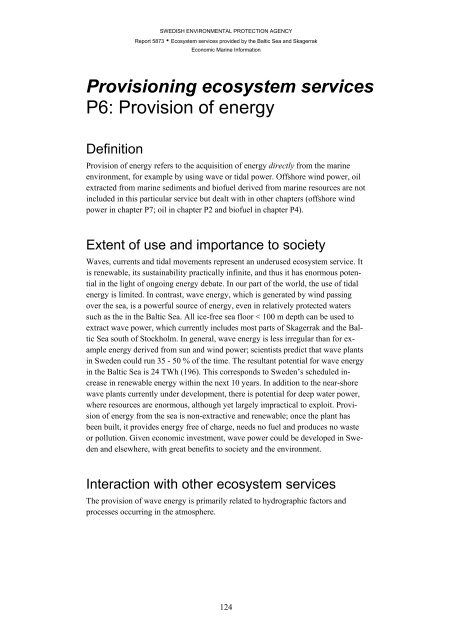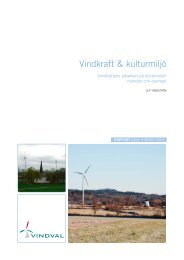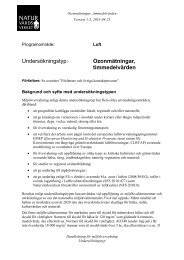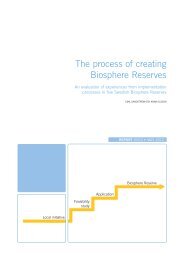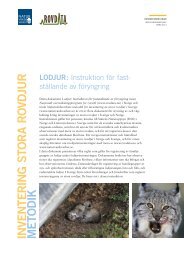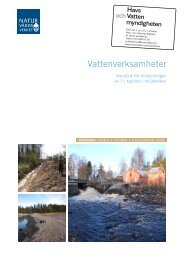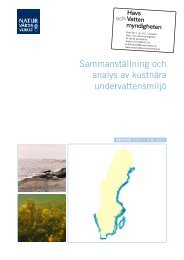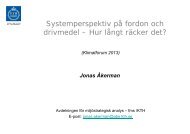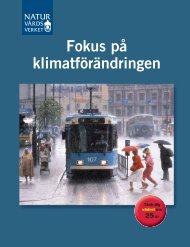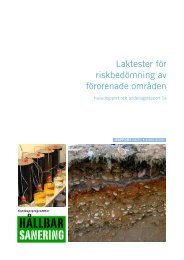Ecosystem services provided by the Baltic Sea ... - Naturvårdsverket
Ecosystem services provided by the Baltic Sea ... - Naturvårdsverket
Ecosystem services provided by the Baltic Sea ... - Naturvårdsverket
Create successful ePaper yourself
Turn your PDF publications into a flip-book with our unique Google optimized e-Paper software.
SWEDISH ENVIRONMENTAL PROTECTION AGENCY<br />
Report 5873 • <strong>Ecosystem</strong> <strong>services</strong> <strong>provided</strong> <strong>by</strong> <strong>the</strong> <strong>Baltic</strong> <strong>Sea</strong> and Skagerrak<br />
Economic Marine Information<br />
Provisioning ecosystem <strong>services</strong><br />
P6: Provision of energy<br />
Definition<br />
Provision of energy refers to <strong>the</strong> acquisition of energy directly from <strong>the</strong> marine<br />
environment, for example <strong>by</strong> using wave or tidal power. Offshore wind power, oil<br />
extracted from marine sediments and biofuel derived from marine resources are not<br />
included in this particular service but dealt with in o<strong>the</strong>r chapters (offshore wind<br />
power in chapter P7; oil in chapter P2 and biofuel in chapter P4).<br />
Extent of use and importance to society<br />
Waves, currents and tidal movements represent an underused ecosystem service. It<br />
is renewable, its sustainability practically infinite, and thus it has enormous potential<br />
in <strong>the</strong> light of ongoing energy debate. In our part of <strong>the</strong> world, <strong>the</strong> use of tidal<br />
energy is limited. In contrast, wave energy, which is generated <strong>by</strong> wind passing<br />
over <strong>the</strong> sea, is a powerful source of energy, even in relatively protected waters<br />
such as <strong>the</strong> in <strong>the</strong> <strong>Baltic</strong> <strong>Sea</strong>. All ice-free sea floor < 100 m depth can be used to<br />
extract wave power, which currently includes most parts of Skagerrak and <strong>the</strong> <strong>Baltic</strong><br />
<strong>Sea</strong> south of Stockholm. In general, wave energy is less irregular than for example<br />
energy derived from sun and wind power; scientists predict that wave plants<br />
in Sweden could run 35 - 50 % of <strong>the</strong> time. The resultant potential for wave energy<br />
in <strong>the</strong> <strong>Baltic</strong> <strong>Sea</strong> is 24 TWh (196). This corresponds to Sweden’s scheduled increase<br />
in renewable energy within <strong>the</strong> next 10 years. In addition to <strong>the</strong> near-shore<br />
wave plants currently under development, <strong>the</strong>re is potential for deep water power,<br />
where resources are enormous, although yet largely impractical to exploit. Provision<br />
of energy from <strong>the</strong> sea is non-extractive and renewable; once <strong>the</strong> plant has<br />
been built, it provides energy free of charge, needs no fuel and produces no waste<br />
or pollution. Given economic investment, wave power could be developed in Sweden<br />
and elsewhere, with great benefits to society and <strong>the</strong> environment.<br />
Interaction with o<strong>the</strong>r ecosystem <strong>services</strong><br />
The provision of wave energy is primarily related to hydrographic factors and<br />
processes occurring in <strong>the</strong> atmosphere.<br />
124


